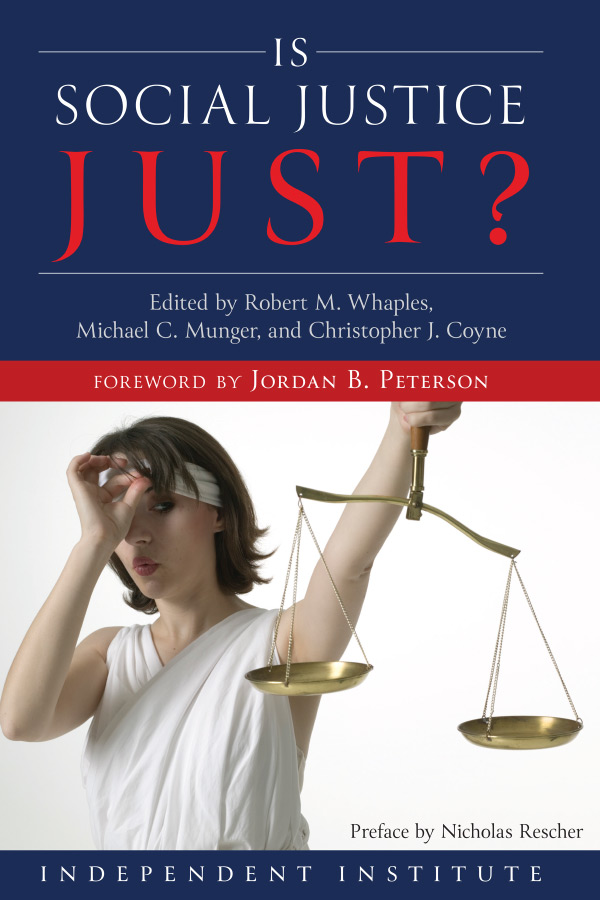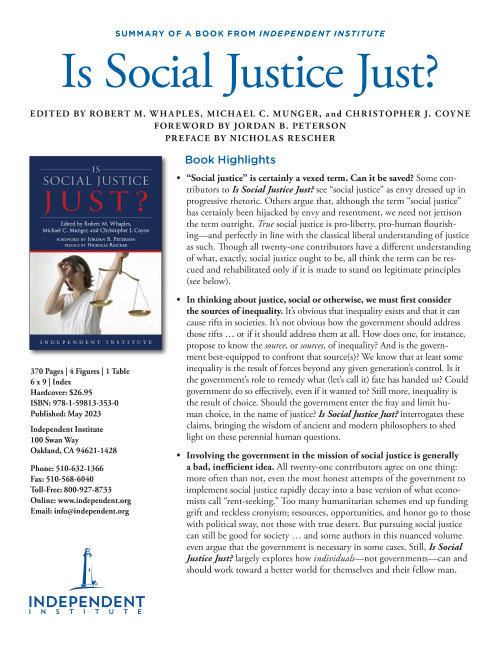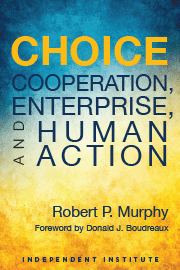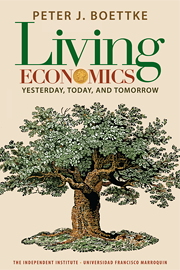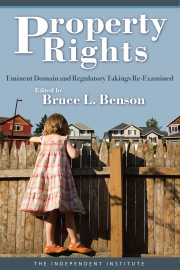| Formats |
Hardcover (ISBN 978-1-59813-353-0) |
| Formats |
Hardcover (ISBN 978-1-59813-353-0) |
Overview
“Anyone concerned with social justice will find this book makes him question his assumptions, rethink his premises, and think!”
—Andrew P. Morriss, professor, Bush School of Government and Public Service, School of Law, Texas A&M University
What is social justice?
In these pages, twenty-one accomplished academics seek to do justice to “social justice.” Inequality exists and obviously causes rifts in societies. But it’s not obvious how the government should address those rifts, or if it should address them at all. Have we forgotten the perhaps more efficient power of personal choice—and the corollary obligation: to serve our neighbors—to make our society more humane?
Beginning with the first political philosophers in ancient Athens, and continuing right through Marx into our post-modern era, men have wrestled with the question of justice; and the answers have been as earnest as they have been varied.
Today, our “expert” class also claim to have answers—updated answers, more “equitable” answers, more technological answers ... in short, answers that are simply better suited to our times.
But are those answers in any way correct? Do they work? Are they—just?
In these elegant, nuanced essays, the authors use the wisdom of ancient and modern philosophers to shed light on these important questions—and the answers are revealing.
Armed with ample evidence from real-world experiences, lessons from history, the wisdom of the classics, modern philosophers, and even the teachings of the world religions, the contributors of Is Social Justice Just? illuminate the central role of the individual in achieving justice in all its aspects.
Read Is Social Justice Just? and discover:
- how to do social justice wrong with the poison of resentment, envy, and ignorance;
- how to do social justice right with the insights of philosophers and theologians;
- how to respect people’s rights and liberties without sacrificing true equality;
- and how to reform flawed public policies that just make everything worse.
In a world of partisanship, hysteria, maliciousness, and good intentions attached to hellish outcomes, this landmark book enters the public discourse at a critical time.
With a foreword by Jordan B. Peterson, a preface by Nicholas Rescher, and a collection of essays by some of the best and brightest scholars of our time, Is Social Justice Just? is a timely and urgent work.
Read it, and you will begin to think about “social justice,” and justice, in some surprising new ways.
Contents
Foreword
The Narcissists of Compassion
Jordan Peterson
Preface
Is Social Justice Just?
Nicholas Rescher
Introduction
New Thinking about Social Justice
Robert M. Whaples
PART I How to Do (Social) Justice Wrong
- Social Justice versus Western Justice
Daniel Guerrière - Social Justice, Economics, and the Implications of
Nominalism
R. Scott Smith - The Mantle of Justice
Adam G. Martin - Social Injustice and Spontaneous Orders
Jacob T. Levy - Hayekian Social Justice
Kevin D. Vallier - Knowledge Problems from behind the Veil of Ignorance
Daniel J. D’Amico - To Give Each Man His Due: The Folly of Dworkin’s
Jurisprudence of Social Justice
William J. Watkins Jr. - An Exchange Theory of Social Justice: A “Gains from
Trade under Uncertainty” Perspective
Anthony Gill
PART II How to Do (Social) Justice Right
A. Use the Insights of Philosophers and Theologians
- Opting Out: A Defense of Social Justice
James R. Otteson - Civil Society and Social Justice: A Prospectus
James R. Stoner Jr. - Social Justice: Intersecting Catholicism, Citizenship,
and Capitalism
John A. Moore - Social Justice or Preferential Option for the Poor?
Martin Schlag - Biblical Christianity and Social Justice
D. Eric Schansberg
B. Let People Build a Just Society on Their Own—and Reform
- The Myth of Social Justice
Pascal Salin - Bleeding Heart Libertarianism and the Social Justice or
Injustice of Economic Inequality
Andrew Jason Cohen
- Classical Liberalism as the Fulfillment of the
Egalitarian Ideal
Axel Kaiser
- Social Justice, Public Goods, and Rent Seeking
in Narratives
Vincent J. Geloso and Phillip W. Magness - Is Social Justice a Mirage?
Stefanie Haeffele and Virgil Henry Storr - Social Justice, Antiracism, and Public Policy
Robert M. Whaples
Notes
Bibliography
Index
About the Editors and Contributors
Credits
Detailed Summary
- “Social justice” is certainly a vexed term. Can it be saved? Some contributors to Is Social Justice Just? see “social justice” as envy dressed up in progressive rhetoric. Others argue that, although the term “social justice” has certainly been hijacked by envy and resentment, we need not jettison the term outright. True social justice is pro-liberty, pro-human flourishing— and perfectly in line with the classical liberal understanding of justice as such. Though all twenty-one contributors have a different understanding of what, exactly, social justice ought to be, all think the term can be rescued and rehabilitated only if it is made to stand on legitimate principles (see below).
- In thinking about justice, social or otherwise, we must first consider the sources of inequality. It’s obvious that inequality exists and that it can cause rifts in societies. It’s not obvious how the government should address those rifts ... or if it should address them at all. How does one, for instance, propose to know the source, or sources, of inequality? And is the government best-equipped to confront that source(s)? We know that at least some inequality is the result of forces beyond any given generation’s control. Is it the government’s role to remedy what (let’s call it) fate has handed us? Could government do so effectively, even if it wanted to? Still more, inequality is the result of choice. Should the government enter the fray and limit human choice, in the name of justice? Is Social Justice Just? interrogates these claims, bringing the wisdom of ancient and modern philosophers to shed light on these perennial human questions.
- Involving the government in the mission of social justice is generally a bad, inefficient idea. All twenty-one contributors agree on one thing: more often than not, even the most honest attempts of the government to implement social justice rapidly decay into a base version of what economists call “rent-seeking.” Too many humanitarian schemes end up funding grift and reckless cronyism; resources, opportunities, and honor go to those with political sway, not those with true desert. But pursuing social justice can still be good for society ... and some authors in this nuanced volume even argue that the government is necessary in some cases. Still, Is Social Justice Just? largely explores how individuals—not governments—can and should work toward a better world for themselves and their fellow man.
As Dr. Jordan B. Peterson points out in his foreword, the “social justice warrior” of our time insists on diversity of every kind, except diversity of outcome. But how can we accommodate diversity of every kind and insist on equal outcomes for all parties? Is Social Justice Just?, edited by Robert M. Whaples, Michael C. Munger, and Christopher J. Coyne, presents a series of essays that lay bare the vacuity of these ideas, without dismissing the importance of justice as such.
One theme rings clearly throughout the volume: government-run efforts to implement social justice are at best woefully inefficient, at worst destructive. Most contributors agree with Friedrich Hayek’s assertion that “social justice” is a kind of mirage, a misguided, incoherent concept that falsely claims society ought to conform to a predetermined “just” pattern. And yet, each author takes seriously those claims of social justice that have captured the modern imagination. The authors respond, earnestly and rigorously, not only to claims about monetary redistribution, but also to claims about institutions, privilege, societal relationships, the role of the state in securing justice, and more.
As readers page through Is Social Justice Just?, a resounding consensus comes to the fore. The term “social justice” can never assume a legitimate role in public discourse unless and until it stands on sound principles. And the first of these principles is man’s inherent dignity and the liberty that flows from that dignity. With ample evidence from real-world experiences, lessons from history, the wisdom of the classics, the modern philosophers, and even the teachings of the world religions, the contributors of Is Social Justice Just? present an invaluable analysis of justice that illuminates the central role of the individual in achieving justice in all its aspects, including its social one.
Social Justice Gone Wrong
In today’s world, the term “social justice” has been hijacked by the ideological left. Of course, that doesn’t mean there is no such thing as social justice, nor does it mean social justice isn’t important. That said, it does mean that misconceptions, abuses, and naïve uses of the term ought to be addressed first.
After a foreword by Jordan Peterson and a preface by Nicholas Rescher, Daniel Guerriere kicks off the discussion. A harsh critic of modern social justice, Guerriere argues that today’s self-proclaimed social justice advocates care more about remaking human consciousness than being either social or just. Modern social justice, Guerriere argues, threatens to undo the discovery, protection, and promotion of the uniqueness of the individual, one of the greatest achievements of Western civilization. Citing the ancient Greeks, Hebrews, and Romans, Guerriere’s critical takedown of modern social justice is as harsh as it is compelling.
R. Scott Smith focuses less on the stakes and more on the specific flaws of the modern social justice movement. He asserts that the key assumption of modern social justice is nominalism, the theory that only particular things exist and that there are no real, universal, identical, or shareable qualities between things. Even ethics, in this modern view, are nominal—which means one cannot recognize by reason what is just or unjust. Consequently, power is the only force capable of backing ethical claims. Thus, ironically, the modern social justice movement cannot hope to give us social justice or any other kind of justice, since it depends on power (not reason) to establish reality.
In the following essay, Adam G. Martin takes us into the psyche of today’s social justice advocate. Martin claims that today’s warriors are animated by a spirit of resentment, which disguises itself in the language of social justice. Jacob T. Levy follows Martin’s analysis with the intellectual history of this inclination, pointing to John Rawls’s Theory of Justice, which posited that social justice ought to address not only poverty, but also racism, sexism, and similar cultural phenomena. Levy points out that, unfortunately for Rawls, many injustices cannot be remedied. Thus, the Rawlsian vision of social justice—embraced by virtually all modern leftists—has bitten off more than it can chew.
Daniel J. D’Amico continues Levy’s critique of Rawls. According to D’Amico, the Rawlsian conception of social justice wrongly implies that one can move from democratic deliberation to positive social outcomes in a straight line. However, D’Amico points out, vast “knowledge problems” lurk behind a “veil of ignorance” that make such a straight line impossible. In this way, D’Amico shows how naïve Rawls’s thinking really is. William Watkins Jr. shifts the spotlight from John Rawls to Ronald Dworkin, another popularizer of social justice as we know it today. Dworkin shows no hesitation in elevating unelected and unaccountable judges to the apex of the political order. He places the people, their representatives, and fundamental law—each, in its own way, a check on power—under the feet of those judges, who are thus made all-powerful. Judges are now equipped, not to see that each man get his due but to ensure that society conform to their notions of fairness. Do we want to live under such a regime?
Finally, Anthony Gill concludes this section on social justice gone wrong with a discussion of economics. Gill notes that today’s social justice advocates assert that gains from trade between a buyer and a seller can and ought to be equal. But this seemingly benign assertion is highly problematic, not only on the grounds of justice, but also on the important, irreducible grounds of preference, competition, and uncertainty. Readers will discover that there are many ways to do social justice wrong. But in each analysis, the contributors of Is Social Justice Just? emphasize the perennial problems of human nature: ignorance, resentment, and hubris.
Social Justice Gone Right
It’s true that the term “social justice” has been hijacked, abused, and levied for destructive purposes. But it does not follow that social justice, rightly understood, should be dismissed. Prominent philosophers and theologians have concerned themselves with justice and man’s relation to it since ancient times. We, too, can and ought to ask such questions. We may yet discover answers that alleviate our present condition.
James Stoner suggests, for instance, that a restoration of Aristotelian and Thomistic anthropology should serve as the basis for a modern conception of social justice. A limited state, however, is central to this vision; the family and civil society must be allowed to flourish without the heavy hand of government interference. John A. Moore shares this belief, insisting that true social justice is a bottom-up phenomenon, with individuals taking responsibility for themselves and for their neighbors. Martin Schlag, like Moore, cites the Roman Catholic Church’s social teachings on this subject. Noting that Pope Francis uses the term “preferential option for the poor” instead of “social justice,” Schlag insists that Francis’s cultural revolution places the human person—not money—at the center of social justice. Thus, only the faithful human person can combat the material and spiritual poverty of our time and do social justice right. D. Eric Schansberg agrees but adds that helping the poor on a voluntary basis is laudable from a Christian perspective, but that state-coerced redistribution of wealth violates the Eighth Commandment, “Thou shalt not steal.”
Pascal Salin offers a practical perspective on how to do social justice right. Arguing for the merits of inequality, Salin insists that human dignity derives from human differences—i.e., human inequalities. The fact that profits happen to result from these differences is not evidence of injustice, but of the “condition for social cooperation between people.” Andrew Jason Cohen continues in this vein, celebrating human differences and arguing that unregulated markets—which necessarily feature human inequality—bring more wealth for all. If inequality is the price to pay for a dramatic reduction of absolute poverty, so be it! Axel Kaiser follows Cohen’s essay with a presentation of the economic science that proves competitive markets and limited governments are most beneficial to underprivileged societies.
But in our time, one must consider government action that will free markets and improve life for all, if only as a matter of prudence. To this end, Vincent J. Geloso and Phillip W. Magness present a much less hostile analysis of today’s modern social justice movement. In their view, classical liberals should admit that lesser outcomes for certain groups have become too obvious to ignore. True believers in social justice must work to dismantle both formal and informal barriers to those forms of equality that are necessary for justice to occur. Racism, for example, must be expressly addressed. Stefanie Haeffele and Virgil Henry Storr follow this line of thinking, going so far as to critique Hayek’s contention that social justice is merely a “mirage.” If it is a mirage, they ask, then why are some players in the marketplace clearly favored, by those claiming to be neutral referees, over others? To say such a situation is not unjust is flatly dishonest.
Finally, Dr. Robert Whaples, one of the editors of Is Social Justice Just?, concludes the collection by earnestly answering a question haunting all social justice advocates today: how can one justly combat racism? Contrasting his thesis with Ibram Kendi’s argument in How to Be an Antiracist—which advocates scrapping capitalism entirely—Whaples suggests a range of antiracist policies that actually will contribute to social justice. Scrapping capitalism is not the answer. And yet, as Whaples concludes his sensible list of policy recommendations, he reminds readers that justice, in whatever form, is a matter that goes beyond governmental policy. It requires us to recognize that we are created to love one another as children of the same God.
Praise
“If I were putting together my dream team to organize a volume to answer the question, ‘Is social justice just?’, it would be Rob Whaples, Mike Munger, and Chris Coyne. And the dream team delivers! Anyone concerned with social justice will find this book makes him question his assumptions, re-think his premises, and think! They have assembled their own dream team of authors to provide insights from a variety of disciplinary perspectives that provoke thought, provide new perspectives, and make the reader want more.”
—Andrew P. Morriss, professor, Bush School of Government and Public Service, School of Law, Texas A&M University
“In the world of public policy, words should mean something, not just sound like they mean something. The words ‘social justice’ are thrown around quite liberally these days, often with the assumption that their meaning is clear—but from the way these words are used, it’s clear that their meaning varies from author to author and sometimes even from paragraph to paragraph in the works of a single author. Here a stellar cast of policy-oriented intellectuals faces this problem head on, attacking the problem of what ‘social justice’ ought to mean and why it matters. It’s about time.”
—Steven Landsburg, professor of economics, University of Rochester
“Social justice is an ambiguous concept that allows people to redefine justice to conform with their own biases. This volume clearly points out problems with the concept and offers a clear-headed analysis of the way the concept should be viewed, along with analyses of socially just policies.”
—Randall Holcombe, DeVoe Moore Professor of Economics, Florida State University
“Though plenty of people have opinions about the importance of social justice, they seldom explain what they mean by the term. Is it a meaningful concept? If so, what constitutes social justice? Are there better and worse ways to pursue it? This collection of readings addresses those controversial issues and more. It is a timely contribution to an important debate.”
—Bruce Caldwell, Research Professor of Economics; director, Center for the History of Political Economy, Duke University
“What principles of social justice will foster peace, cooperation, and mutual respect among highly diverse individuals within a decidedly pluralist society rather than foster exploitation, tribal conflict, coercive re-education, and the enhancement of arbitrary state power? From their own distinctive philosophical or economic perspectives, the contributors to Is Social Justice Just? converge toward the powerful conclusion that justice must be modest. It must protect each person’s life, liberty, and property and not proclaim purportedly radiant social ends to which people’s lives, aspirations, and fortunes are to be sacrificed.”
—Eric Mack, professor of philosophy, Tulane University
“With more clamor for ‘social justice’ in the public square today than serious inquiry into what social justice consists of, the essays in Is Social Justice Just? are timely and essential reading. Twenty-three scholars lay bare both the promise and pitfalls of initiatives that are taken under the social justice banner.”
—J. Daniel Hammond, Hultquist Family Professor (emeritus), Department of Economics, Wake Forest University
“Is Social Justice Just? brings together a remarkable collection of scholars who study one of the most controversial issues of our time, one that has created enormous divisions across social, political, cultural, economic, racial and religious lines. Each author deconstructs social justice using his own unique set of analytical tools, with the hope of creating a concept of justice that can help bring society back together. A broad consensus emerges from this process, as these scholars are individually led to a reconstruction of social justice focused on the sanctity and the beauty of each of us as individuals, individuals who have the same rights and freedoms and opportunities to create our own paths, while respecting the choices of others. Read this book, and you will look at our world with a very different and much more optimistic vision than you have now.”
—Lee Ohanian, professor of economics and director of the Ettinger Family Program in Macroeconomic Research, University of California, Los Angeles
“Readers of this book will be rewarded by the interdisciplinary perspectives on social justice from a distinguished group of contributors ...”
—Barry W. Poulson, professor of economics (emeritus), University of Colorado
“In the zeitgeist of our times, social justice is just by definition, as well as by intuition and emotion. The articles in this book put the conventional wisdom to the test, with rational analyses from a number of different perspectives.”
—Pierre Lemieux, economist, Department of Management Sciences at the Université du Québec en Outaouais (Canada)
“A popular intellectual sport is to classify individuals into this or that group and then to ask: Is this or that group ‘owed’ something by society? With such classifications typically guided by political considerations, the answer is very often ‘yes.’ And because ‘owe’ implies obligation, and because justice demands the fulfilment of all obligations, justice demands that society—in one form or another—pay up. Or so goes the argument for ‘social justice.’ The papers in this remarkable volume examine this argument from a variety of perspectives. It’s a feature and not a bug of this collection that, no sooner are you convinced by one paper, then another paper turns your mind in a different direction.”
—Donald J. Boudreaux, professor of economics, George Mason University
Awards
2024 Next Generation Indie Book Awards
- Finalist in General Nonfiction
2024 IBPA Benjamin Franklin Awards
- Gold Winner in Political & Current Events
2023 “Best Book” Awards (American Book Fest)
- Winner in Social Change
- Finalist in Current Events

